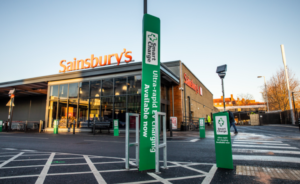TfGM secures electric charging funds
Transport for Greater Manchester (TfGM) has been awarded the maximum amount of funding available from the Government’s £40 million Clean Air Plan ‘early measures’ national fund.
TfGM won £3 million of new funding to expand and promote its electric vehicle charging network.
As a result, a further 48 rapid charging points (24 dual bays) are now set to be installed next year, and will be based where they can best help reduce high levels of NO2. This adds to the 318 that already exist in the Greater Manchester Electric Vehicle (GMEV) network.
Awareness
As well as the new charging points, the funding will support a major push to raise awareness and take-up of electric vehicles in the region.
The government’s £40 million fund is specifically aimed at helping areas like Greater Manchester introduce quick steps to meet legal air quality targets as soon as possible.
According to statistics from the Greater Manchester Combined Authority, road transport in Greater Manchester is responsible for almost two-thirds of the emissions of nitrogen oxides, and the region has been in breach of its legal limits for nitrogen dioxide every year since 2011.
Mayor of Greater Manchester, Andy Burnham, who recently outlined plans to double the city’s EV network, explained the lofty ambitions he has set.
Challenge
Mr Burnham said: “This week I issued a challenge to people across Greater Manchester to help make us a leading green city-region across the UK and Europe. Tackling transport-related air pollutants is a key part of this and one of our biggest challenges.
“Going electric is becoming easier than ever so it’s vital that we have the right charging infrastructure to support demand for greener travel.”
He added that as vehicle costs reduce and battery capacity increases uptake in electric vehicles follow suit.
The Greater Manchester Electric Vehicle (GMEV) scheme launched in July 2013 with £2.1 million funding from the Office of Low-Emission Vehicles, against a backdrop of low electric vehicle use.
The number of drivers registered with GMEV has increased from 48 in 2013 to nearly 2,000 by the end of 2017. The group says that on average, 50 new members are joining each month.

















